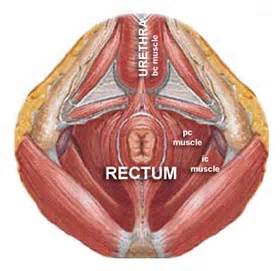 These muscles could use a workout
These muscles could use a workout
I am writing in praise of Kegels, the pelvic floor “exercises” that can improve just about anyone’s sex life. When we think of our sexual body parts, mostly people think of the penis, vagina, vulva. But in actuality our genitals are surrounded and supported by the very important pelvic floor muscles. The pelvic floor muscles contract as a part of orgasm in both men and women. Strong contractions of these muscles can be felt by partners if you are engaging in penetrative sex and a taut vaginal canal can improve sensation for both people involved. Men who want to have multiple orgasms train themselves to contract their pelvic floor muscles on command. And people say that their orgasms become more intense as they strengthen these muscles.
Like in other areas of the body, muscles that are too tense limit us and limit sensation, muscles that are too weak limit our control and movement and, in the case of pelvic floor muscles, limit our orgasmic ability. If a muscle stays weak for too long it can atrophy. But, again as with other muscles in our body, we can always train the muscles to make them healthier. What we want is a balanced healthy set of muscles that we feel we have some control of and connection to. Note that balance includes being able to relax these muscles as well. Sometimes chronic tension in the pelvic floor muscles can contribute to sexual pain and learning to release the muscles brings relief.
So how do we do Kegels? The great thing is you can do them anytime, anywhere. No one will notice. One way people can get familiar with these muscles is to try and stop your stream of urine. You will instinctually use your pelvic floor muscles to clamp down on the flow. That isn’t am especially fun way to practice, but try it if you feel unsure about how to access these muscles. To practice Kegels, you think about the floor of your pelvis – the area between the vaginal open and the anus or between the scrotum and the anus – and imagine pulling that area upward into your body. It is a small movement. Try doing several small pulses and then hold the contraction for a longer time. As you get more control you can play with contracting more to the front of your body, then more to the back or contracting in time to music. Always remember the release portion too though. And ideally you want to not use your buttocks or thigh muscles to do this, so work on keeping those areas of your body relaxed.
Still wondering if you are doing it right? You can see the muscles contract. Those of you with a vulva will need a handmirror or you can insert a finger and feel the muscles contract if they are strong enough. Those of you with a penis can make the penis twitch, easier to see with an erection, or you can insert a finger into your rectum to feel a contraction. Keep trying, you will get it.
Each time you do a Kegel, contract and release, a rush of blood flows into the tissue. This will keep the tissue healthy and in women it will also increase lubrication, so Kegels are also a great way to warm your body up for sex. Fair warning, doing Kegels will increase your sex drive. They can be a great way to use commuting time but you may arrive at your destination with sex on your mind. Enjoy.
 I never had this sign fully explained to me.
I never had this sign fully explained to me.
The classroom in Uganda had cement walls and all the doors and windows open because it was hot. This let some chickens into the classroom which I had gotten used to. My highly intelligent and driven students were there getting their Master’s degrees in Psychology. We were having a tense morning, having conversations about cultural sexual norms and myths about masturbation. One of my students said, almost in passing, “America brought masturbation to Africa”. Now I admit, part of me, the hot, tired, kind of punchy with culture shock part, felt a bit delighted by this statement and wanted to make some jokes like, “wow, an export that we can be proud of” or some such. But I knew we were talking about something deeper - what we believe is natural sexual behavior.
Now the thing that was funny about this for me was that my perspective on masturbation was so different. I see it as a natural part of human behavior, not invented or exported or even necessarily taught. I believe that with this highly sensitive body that we are born with, it is natural to explore it. It is normal to find those super sensitive, nerve rich places and it is normal to want to touch them sometimes. Sex researcher Kinsey described masturbation as instinctual human behavior. Young kids touch themselves without being taught to do so. Adults with evolving sexual desire will find that masturbation can relieve internal and physical pressure. All over the world in all kinds of cultural settings people masturbate, though they may not tell anyone about it. I believe that without any cultural influence one way or another people will find masturbation for themselves. They may not get creative about it but they will do it. (And as far as creativity goes, there is a rich history of sex toys that goes way back.)
For all the concerns about masturbation, and they have been intense, research has been unable to document any health or psychological damage from common masturbation habits. (Like all other behaviors, masturbation can be done compulsively but this is not a common outcome of masturbating). In fact, many studies have found benefits associated with orgasms, which for many people may be most easily reached through masturbation at least at some periods in their life. In our class in Uganda, we were able to reach some agreement and what I might call respect for the possible benefits of masturbation, even in a cultural model that only wants to acknowledge heterosexual partnered procreative sex as “normal” sex. Together we honored the gifts of masturbation such as, a release of sexual tension that may allow someone to make other sexual choices more clearly, a way to learn how your own body works so you can take more pleasure in sex with a partner, a strategy to re-learn arousal patterns and help to relieve sexual pain patterns.
I doubt any of my students in Uganda are going to endorse masturbation and that is ok. But I think they were able to see that it doesn’t need to be feared and that the instinct to masturbate may come from some healthy internal drives, rather than of from external perverting influences. Masturbation, like other sexual behaviors, is a choice we have, a personal choice. Nothing to be afraid of.
Now you can join the Conscious Sexual Self community on Facebook! https://www.facebook.com/ASexPositiveLife
Tom is not meeting my eyes as he sits in my office. He quickly blurts out that he has been looking at porn online, pretty often, and is worried that he has changed his desires and that now he will never be satisfied with the sex he and his wife have.
Sarah says she is frustrated with sex with her partner and practically whispers, “Could my using a vibrator have made it so I can’t orgasm without it anymore?”
Both these people are asking a similar question, “Has something I have done changed my sexual responses permanently? Am I still normal?” And of course, the really unspoken question, “Is sex dangerous? Can I ruin myself in some way?” The thing is we have been led to believe that sex is dangerous, that there are bad behaviors, that we are all just one misstep from being a damaged sexual being. But the truth is, we, as humans, are a lot more adaptable than that. And now we are finding brain science to back that up.
There are two brain concepts that are helpful here. One is the principle of learned disuse. This is not a complicated thing to understand and we are all familiar with it. If you stop trying to do something, you will more quickly lose the ability to do that thing. Pretty simple. This is true for all kinds of behaviors or skills. But what we know from the frankly amazing extents of human recovery, and now from brain scans, if people work at regaining a skill, even if that skill has atrophied and it is now very hard to do, people can rewire their brain to recover that ability. It may not be easy, it may in fact be quite frustrating especially if you have developed an easier way to meet a similar need, but it can be done. Which bring us to the concept of neural plasticity. Science-y sounding words, yes, but again fairly easy to understand. Our brains our fundamentally flexible, they are ready to learn patterns. In the brain’s readiness to learn patterns we train our brain; it is efficient and designed to respond quickly. So if we do a behavior a certain way several times we are programming our brain to that behavior. That pattern will become the default program for us. Neuroscience researcher, Norman Doidge MD, explains this beautifully with a snow analogy. Think if walking through fresh snow, the first pass through you set down a trail of slightly packed snow. When you walk that way again, it will be easiest to step into the track that is already laid down. Each pass makes that track more efficient for you and in fact, it will be difficult to walk to either side of it; your feet will be pulled into the track already laid down. But you can choose to walk outside that track. It will take more effort but you can eventually lay down a new path in the snow. The same is true for our mind and our behaviors.
So this is true of our sexual behaviors too. Sarah and Tom may have laid down some patterns for themselves that now are holding them back from experiencing other sexual elements that they want. But they can retrain themselves to have new patterns. It may be frustrating at first. It may involve avoiding the easy path that has been working for them in other ways, doing things differently. But the flexibility is there. So, no you are not ruined. You are a creature of habit in ways that go deeper than we imagined, but also a creature of continuous change and growth. If you are willing to be frustrated for awhile, you can make changes, to your sex life and to other aspects of yourself.
Andy & Misty are 6 years old. They are playing in Misty’s backyard while her parents make dinner. The game of the moment is to climb on top of the picnic table and jump off. While jumping off you pull your pants down to flash your friend. Both kids think this is hilarious. They also know they are doing something that is not allowed if adults are around and that is part of the fun. They are each fascinated by the fact that their bodies look different under their clothes.
For awhile this is their favorite game. But after a few weeks of it, they will get bored and move on to something else. If they are really comfortable with each other, they may admit their curiosity and take closer looks at each other’s genitals while standing still. Maybe at some point they may play a game with kissing or even touching, but that’s not this game. This game is about jumping, and flashing parts you aren’t supposed to show, and getting a peek at a differently shaped body. It’s not a game about sex; that is an adult framework. It is about exploring and risking and your body being your own. And it is perfectly common and healthy.
Kids find all kinds of creative ways to explore their world and bodies are a part of that world. Many of us will have our own stories of exploration with childhood friends. And for most of us, if there is shame attached to this memory it is because of adult intervention from being caught and scolded. Healthy kids, who have not been abused or traumatized, will engage in explorative play of genitals without fear. They may be embarrassed if caught, because they know it is “naughty”. If they are following natural curiosity, no one will be bullied or pressured into anything and the play will feel mutual. There may be giggling and silly questions. None of this tells us anything about Andy or Misty’s sexual orientation, nor would it if it was Andy & Arthur playing or Misty and Monique. It certainly doesn’t mean that the kids will be overly interested in sex or that they have any trouble with impulse control. What it actually might mean is that they are not afraid of their body and so they let it be a part of their play.
 Temple Art
Temple Art
Imagine for a moment that when you grew up you went to worship in a place that had on its walls images of people engaging in sex acts, humans with humans, humans with deities, all depicted as sacred.
Imagine being taught in your temple or church that the gift of sexual pleasure is something to be honored and that learning to pleasure your partner is an important adult responsibility.
Imagine in studying your sacred text you openly discussed the section that uses sexual desire and expression as a metaphor for love between humans and God.
Imagine it being common for spaces of worship to have statues and icons of human bodies with exaggerated genitals and breasts, to be celebrated and honored.
Imagine if your worship included dancing - real sweaty, hip shaking, undulating dancing - and your grandma, your baby cousin, and your priest were all there dancing and sweating next to you.
Now I am not suggesting that it should have been this way for you. Each person’s connection to their religious or spiritual practice is unique. And I am not suggesting that these are cultural models that are better than others, I believe life is too complicated to make sweeping statements like that. But these are models that exist and I think it is valuable to consider different perspectives and how they might impact us and our beliefs about our sexual selves. What it might have been like to have your sexuality interconnected with the sacred? Is this something you can imagine? Is it something you want?
Many of us have experienced a disconnection between the body and its sexuality and the spiritual and sacred. And of course, many of us have been wounded by expressions of faith that exclude or deny realities of sexuality. Many people are trying to find ways to reconnect those elements of life. Some people have had transcendent moments while being sexual that have surprised them, moments of feeling deeply connected to something bigger than themselves. Some have felt awe for the human body and for the depth of desire. Some are yearning for something different, even if it is just in the way we feel and experience our self. In yearning, I think it is helpful to engage with wondering. What if? What if I saw this differently? Can I be curious about how other people see it? So what if you let yourself imagine, not to find an answer but just to open up the questions and possibilities? What might that open up in you?